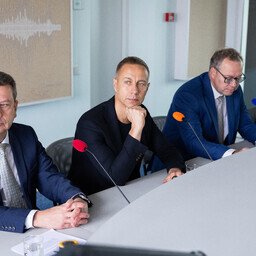Neljast Eesti Panga presidendikandidaadist osalesid debatis Andrus Alber, Ülo Kaasik, Kilvar Kessler ja Margus Rink. Nad arutasid, kas Eesti Pank ja finantsinspektsioon (FI) peaksid ühinema.
Kilvar Kessler, kes praegu juhib finantsinspektsiooni, ütles, et ühendamine oleks hea mõte. Ta usub, et
ühendasutus saaks paremini täita oma ülesandeid
. Samuti annaks see Eestile tugevama hääle Euroopa Liidus. Lisaks lihtsustaks see kriiside lahendamist.
ühendasutus saaks paremini täita oma ülesandeid
Tõlge fraasile: ühendasutus saaks paremini täita oma ülesandeid
EN
the merged institution could better fulfill its tasks
Margus Rink oli ühendamise vastu. Ta ütles, et
suured organisatsioonid ei tööta alati hästi
. Tema arvates ei tooks ühendamine kokkuhoidu. Pigem tekiks suur ja keeruline organisatsioon.
suured organisatsioonid ei tööta alati hästi
Tõlge fraasile: suured organisatsioonid ei tööta alati hästi
EN
large organizations do not always work well
Andrus Alber märkis, et
paljud maailma ühendamised ebaõnnestuvad
. Ta ütles, et enne otsust tuleks teha põhjalik analüüs. Praeguses analüüsis on palju puudu.
paljud maailma ühendamised ebaõnnestuvad
Tõlge fraasile: paljud maailma ühendamised ebaõnnestuvad
EN
many mergers in the world fail
Ülo Kaasik ütles, et ühendamisel on nii plussid kui miinused. Plussid on parem koostöö ja info vahetamine. Miinus on see, et mõnda FI ülesannet ei saa Eesti Pangale üle anda. Ta lisas, et ühendamine on poliitiline otsus, mitte Eesti Panga otsus.
Kõik kandidaadid leidsid, et
Eesti Pank peaks oma rolli ühiskonnale paremini selgitama
. Margus Rink ütles, et inimesed ei tea alati, millega keskpank tegeleb. Andrus Alber soovitas algatada majandusdebatte. Kilvar Kessler ütles, et keskpank peaks rääkima keerulistest asjadest lihtsalt. Ülo Kaasik lisas, et suhtlemist ühiskonnaga saab parandada.
Eesti Pank peaks oma rolli ühiskonnale paremini selgitama
Tõlge fraasile: Eesti Pank peaks oma rolli ühiskonnale paremini selgitama
EN
the Bank of Estonia should better explain its role to society
Inflatsiooni kohta ütlesid kandidaadid, et Eesti Pank on nõuandja. Euroopa Liidus tehakse
rahapoliitika ühiselt
. Kessler ütles, et erinevaid majandusi saab tasandada fondidega. Rink lisas, et Eesti ühiskond peaks aru saama, et erisusi on raske teha. Alber ütles, et maksupoliitika mõjutab inflatsiooni. Kaasik arvas, et riiklik poliitika saab inflatsiooni mõjutada.
rahapoliitika ühiselt
Tõlge fraasile: rahapoliitika ühiselt
EN
monetary policy jointly
Majandusprognooside kohta ütles Kaasik, et
lühiajalisi prognoose on lihtsam teha
. Pikemaajalised prognoosid on keerulisemad. Alber ütles, et Eesti majandust on raske ennustada. Rink lisas, et
keskpanga sõnal on tähtsus
. Kessler ütles, et prognoosid on vaid hinnangud.
lühiajalisi prognoose on lihtsam teha
Tõlge fraasile: lühiajalisi prognoose on lihtsam teha
EN
short-term forecasts are easier to make
keskpanga sõnal on tähtsus
Tõlge fraasile: keskpanga sõnal on tähtsus
EN
the central bank's word has significance
Eelarvepoliitika kohta ütles Rink, et Eesti Pank on juba hoiatanud. Alber ütles, et
valitsus teeb populaarseid otsuseid
. Kaasik arvas, et
keskpank peaks selgitama, kuid mitte käituma jõuliselt
. Kessler ütles, et keskpank näitab riske, kuid ei saa otsuseid teha.
valitsus teeb populaarseid otsuseid
Tõlge fraasile: valitsus teeb populaarseid otsuseid
EN
the government makes popular decisions
keskpank peaks selgitama, kuid mitte käituma jõuliselt
Tõlge fraasile: keskpank peaks selgitama, kuid mitte käituma jõuliselt
EN
the central bank should explain, but not act forcefully
The four candidates for President of the Bank of Estonia, Andrus Alber, Ülo Kaasik, Kilvar Kessler, and Margus Rink, participated in the debate. They discussed whether the Bank of Estonia and the Financial Supervision Authority (FI) should merge.
Kilvar Kessler, who currently heads the Financial Supervision Authority, said that merging would be a good idea. He believes that a unified institution could better fulfill its tasks. It would also give Estonia a stronger voice in the European Union. Additionally, it would simplify crisis resolution.
Margus Rink was against the merger. He said that large organizations do not always work well. In his opinion, the merger would not bring savings. Instead, it would create a large and complex organization.
Andrus Alber noted that many mergers around the world fail. He said that a thorough analysis should be done before making a decision. The current analysis is incomplete.
Ülo Kaasik said that merging has both pros and cons. The pros are better cooperation and information exchange. The con is that some FI tasks cannot be transferred to the Bank of Estonia. He added that merging is a political decision, not a decision for the Bank of Estonia.
All candidates agreed that the Bank of Estonia should better explain its role to society. Margus Rink said that people do not always know what the central bank does. Andrus Alber suggested initiating economic debates. Kilvar Kessler said that the central bank should explain complex matters simply. Ülo Kaasik added that communication with society can be improved.
Regarding inflation, the candidates said that the Bank of Estonia is an advisor. Monetary policy in the European Union is made jointly. Kessler said that different economies can be balanced with funds. Rink added that Estonian society should understand that differences are hard to make. Alber said that tax policy affects inflation. Kaasik believed that national policy can influence inflation.
Regarding economic forecasts, Kaasik said that short-term forecasts are easier to make. Long-term forecasts are more difficult. Alber said that the Estonian economy is hard to predict. Rink added that the central bank's word is important. Kessler said that forecasts are only estimates.
Regarding budgetary policy, Rink said that the Bank of Estonia has already warned. Alber said that the government makes popular decisions. Kaasik believed that the central bank should explain but not act forcefully. Kessler said that the central bank shows risks but cannot make decisions.

